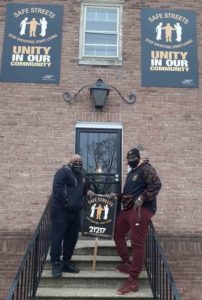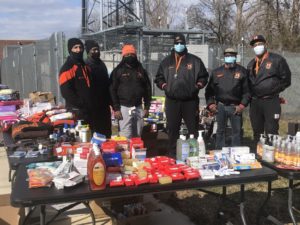On a recent Friday morning, Corey Winfield was on his way to pick up donated diapers. It’s just another way the director of Catholic Charities’ Safe Streets program in Brooklyn-Curtis Bay is trying to disrupt violence and save lives.
Why diapers when Safe Streets is aimed at stopping the shooting on Baltimore streets?
“You have to go out there and get those resources people need. If I’m helping a young man, it’s not just me helping him – it’s helping the whole family,” he explained. “Grandma might need help with the water bill, and I’ve got to find some way to help them. It takes a village to raise one. You have to find those resources.”
Catholic Charities opened its first Safe Streets site in Sandtown-Winchester five years ago, following the death of Freddie Gray in police custody, and the second in Brooklyn-Curtis Bay in 2019. These are two of Baltimore City’s 10 sites for the Safe Streets program, an evidence-based public health initiative designed to reduce gun violence by deescalating and mediating disputes that might otherwise lead in that direction.

Marshburn and Winfield have spent five years with Catholic Charities’ Safe Streets programs.
Over the past five years, the Catholic Charities sites have conducted nearly 2,000 mediations and witnessed a notable drop in shootings. In Sandtown-Winchester, for example, shootings fell from 10 in 2016 to just four last year. As importantly, the programs have earned the trust of local communities.
“It’s OK, Safe Streets. We got this.”
Greg Marshburn, director of the Sandtown-Winchester program, has worked at the site since it opened and watched the effort mobilize the neighborhood. Not long ago, his team was called to respond to a growing crowd, but they returned to the office about 10 minutes later. When he asked them what happened, his staff said people in the crowd had waved them off, saying, “It’s OK, Safe Streets. We got this.”
“When we first got to this community, people would laugh at us and say it doesn’t work. … Now they want to be part of this,” he said.
Earning that trust requires being in the community day-in and day-out, knowing people well and serving as an unbiased resource when conflicts arise. At any moment, Safe Streets may be called to respond to a range of pressing needs – diapers, a job opportunity or a way out of a bad situation.

A toy and coat giveaway in Brooklyn-Curtis Bay helps Safe Streets build trust in the community.
“You can’t do social work from behind the desk. Social work means you’ve got to come out and be social,” Winfield explained. “You’ve got to come out and show that you love somebody.”
Building the program through personal commitment
Marshburn and Winfield were both recruited to Catholic Charities from other Safe Streets sites, with a recognition that their in-depth knowledge and previous experiences were invaluable to building a successful effort quickly.
Marshburn had started at the Safe Streets Mondawmin site two years earlier, shortly after he came home from prison. He said he hadn’t fully understood the magnitude, positivity or complexity of the program, but his commitment was personal.
“I shed a lot of blood out there, and I had a lot of mine shed,” he explained. “I just wanted to clean up what I had messed up.”
Marshburn’s dedication and work ethic led to a series of promotions and, eventually, his move to the nascent Sandtown-Winchester site.
Winfield started at Safe Streets’ inaugural site in Baltimore in 2007, working his way through every position on the team over the next 13 years. His younger brother had been murdered in front of their mother’s house, and he wanted to help other families escape that pain.

Winfield (third from right) and his Safe Streets team in Brooklyn-Curtis Bay.
“I’m going to get to where nobody has to cry, and nobody has to die,” he said. “When you leave your house, what do you say? I’ll see you later. I want to make sure you’re able to keep that promise.”
Enough is enough
The city was painfully reminded of the tenuousness of that promise and the seriousness of this work in January when Dante Barksdale, a well-known Safe Streets leader, was fatally shot in an East Baltimore housing project.
“There are 90 people who work for Safe Streets at these sites, and 90 of them could not match his passion for the job,” Marshburn said. “He had a personal vision that was out of this world. He was the face of Safe Streets, and I feel like that person shot us in the face.”
Despite tragedy, Marshburn and Winfield are both steadfast in their commitment to the mission and in their belief that things can change.
“I’ve seen how it can be done. I’ve seen it work,” Winfield said. “Senseless murders and shootings are not just happening here. Somebody has to stand up and say enough is enough.”
